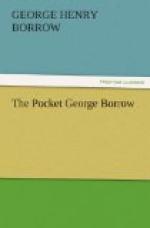‘Are you then one of us?’
* * * * *
Upon the shoulder of the goatherd was a beast, which he told me was a lontra, or otter, which he had lately caught in the neighbouring brook; it had a string round its neck, which was attached to his arm. At his left side was a bag, from the top of which peered the heads of two or three singular looking animals; and at his right was squatted the sullen cub of a wolf, which he was endeavouring to tame. His whole appearance was to the last degree savage and wild. After a little conversation, such as those who meet on the road frequently hold, I asked him if he could read, but he made me no answer. I then inquired if he knew anything of God or Jesus Christ; he looked me fixedly in the face for a moment, and then turned his countenance towards the sun, which was beginning to sink in the west, nodded to it, and then again looked fixedly upon me. I believe that I understood the mute reply, which probably was, that it was God who made that glorious light which illumes and gladdens all creation; and, gratified with that belief, I left him and hastened after my companions, who were by this time a considerable way in advance.
* * * * *
I have always found in the disposition of the children of the fields a more determined tendency to religion and piety than amongst the inhabitants of towns and cities, and the reason is obvious—they are less acquainted with the works of man’s hands than with those of God; their occupations, too, which are simple, and requiring less of ingenuity and skill than those which engage the attention of the other portion of their fellow-creatures, are less favourable to the engendering of self-conceit and self-sufficiency, so utterly at variance with that lowliness of spirit which constitutes the best foundation of piety.
* * * * *
‘C’est moi, mon maitre,’ cried a well-known voice, and presently in walked Antonio Buchini, dressed in the same style as when I first introduced him to the reader, namely, in a handsome but rather faded French surtout, vest, and pantaloons, with a diminutive hat in one hand, and holding in the other a long and slender cane.
‘Bon jour, mon maitre,’ said the Greek; then, glancing around the apartment, he continued, ’I am glad to find you so well lodged. If I remember right, mon maitre, we have slept in worse places during our wanderings in Galicia and Castile.’
‘You are quite right, Antonio,’ I replied; ’I am very comfortable. Well, this is kind of you to visit your ancient master, more especially now he is in the toils; I hope, however, that by so doing you will not offend your present employer. His dinner hour must be at hand; why are you not in the kitchen?’
‘Of what employer are you speaking, mon maitre?’ demanded Antonio.
’Of whom should I speak but Count —–, to serve whom you abandoned me, being tempted by an offer of a monthly salary less by four dollars than that which I was giving you?’




